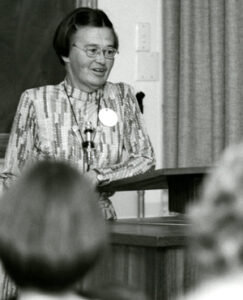n the late 1970s Dr Holmes became general manager of the Institute under director Sir Gustav Nossal. Her main responsibilities included the selection, training and supervision of laboratory technical staff and the development of Laboratory Animal Services.

She also had a major role in the design and construction of the Institute’s animal breeding facilities at the Clive and Vera Ramaciotti
Laboratories at Kew. She became an expert in animal breeding and care, including the maintenance of germ-free and pathogen-free status.
In the early and mid 1980s, she was closely involved in the design and construction of the laboratories in the Parkville building, liaising between scientific staff and the architects.
Dr Holmes officially retired in December 1986, but continued her relationship with the Institute until she passed away in November 2016.



